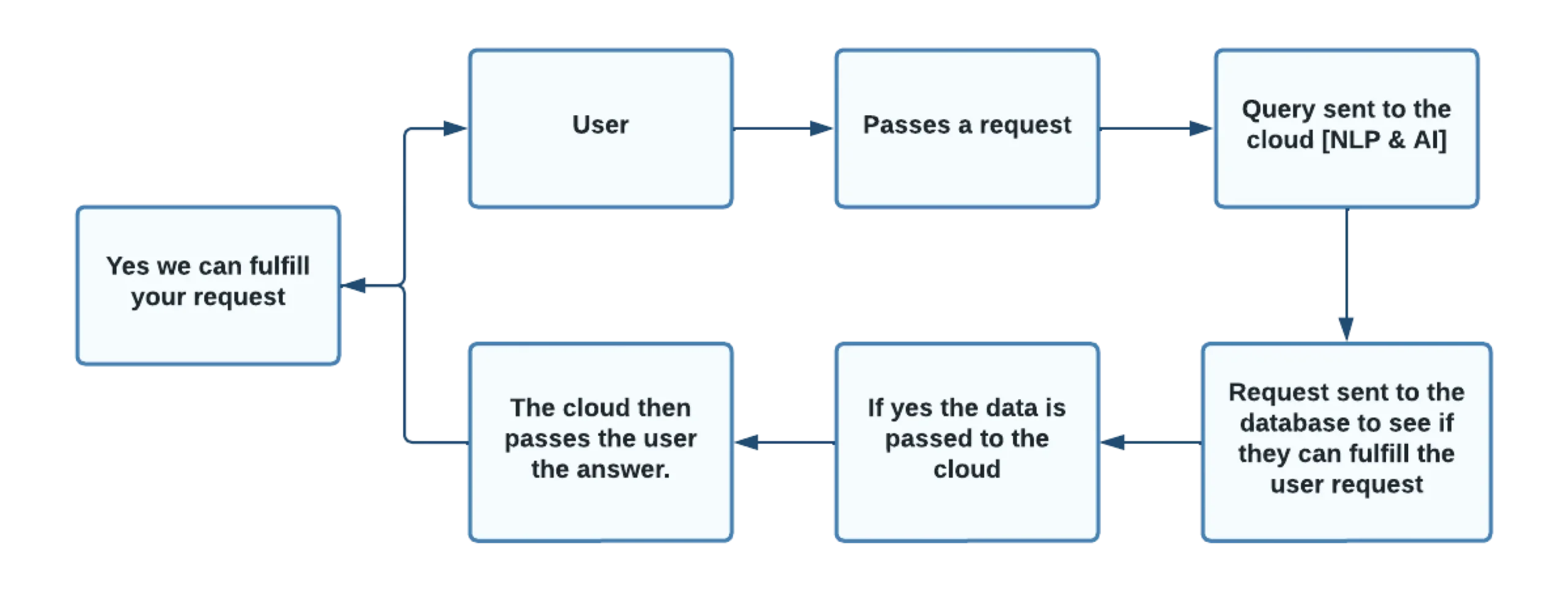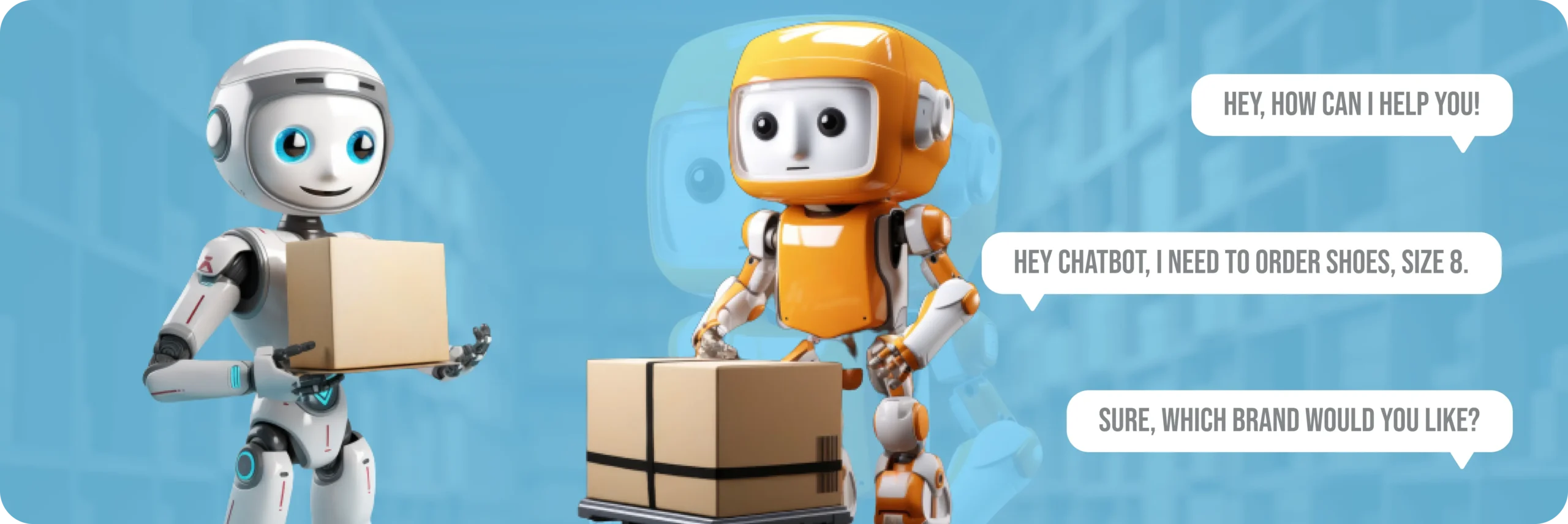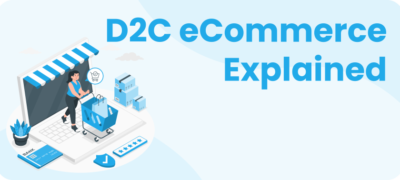AI Chatbot To Boost Your Logistics and Supply Chain Business
Short Description
DLH, UPS, and FedEx have already adapted to the chatbots and performing way better by saving their time, this is your sign to hop on to the blog and learn how a chatbot can help boost your logistics and supply chain management business. Don’t worry before we explain to you the lavishing benefits you’ll be getting, we’ll explain to you what exactly is a chatbot and how it’ll work
to help your business.
Introduction
The Logistics Industry worldwide is expected to be worth 13.7 billion euros or more by 2027. You can easily understand from these figures how the logistics industry facilitates the trade entrepreneurial activities between various parties by delivering goods through B2B, BC, or C2C supply chain operations. However, have you ever wondered how difficult or chaotic it must be to
keep everything in order in logistics? It isn’t easy.
What If I told you we can offer you a partner that can help take a bit of a burden off your shoulders? Yes, that’s right, we are talking about chatbots. These chatbots help you streamline your operations in the supply chain, FAQs for your customers, and be present 24*7. It is always at your service. Let’s dive in and learn how these AI chatbots help your supply chain management and
logistic operations boost your business.
What are Chatbots?
Chat is to talk to someone and Bot is an internet robot. So, combined chatbots are internet robots you can interact with to clear your doubts and get answers to your queries. There are various chatbots such as rule-based chatbots, menu-driven chatbots, keyword recognition chatbots, machine learning chatbots, hybrid chatbots, voice-enabled chatbots.
Type Of AI Chatbots You Can Use in Logistics
- 1. Rule-based Chatbots – Rely on a pre-defined set of rules and keywords to understand user queries and respond with predefined answers.
- 2. Menu-driven Chatbots – present the user with a menu of options to choose from, so the user clicks buttons or selects options while navigating through the menu.
- 3. Keywords Recognition Chatbots – This capability sharpens its focus on essential information relevant to the task at hand.
- 4. Machine learning Chatbots (AI-powered) – Use advanced machine learning algorithms to learn and improve over time. they can handle vast amounts of conversation data to understand user intent and respond precisely.
- 5. Hybrid Chatbots – These might use rule-based responses for common questions and machine learning for more complex interactions. so it combines elements of different chatbot types.
- 6. Voice enable Chatbots – Interact with a user through voice command. They use speech recognition and text-to-speech technology to stimulate conversation.

Nearly nine out of ten users (88%) have interacted with a chatbot at least once in 2022.
How do Chatbots work?

Here’s an example of a chatbot in a supply chain operation(logistics). Let’s take a scenario where a company that supplies athletic shoes to retail stores. Here’s how a chatbot designed for the
supply chain operations might work:
User[Store Manager] → Passes Query, “Hey chatbot, I need to reorder Swift running shoes, size 8” → Chatbot uses NLP to understand the request → The NLP identifies key information like the shoe brand, model, and size, and implies a reorder request based on low stock → Chatbot will connect to the company inventory management system and provide a real-time data on the stock level at warehouse and distribution centers → Chatbot checks for the availability of the specific shoes in size 8 → Chatbot will respond to the user[Store manager] according to the availability and
other information retrieved.
If it is in stock, it’ll pass a message, “We have enough Swift running shoes (size 8) in stock to fulfill your reorder. How many pairs would you like?”
If it is not in stock, it’ll pass a message, “We are currently out of stock for Swift running shoes (size 8). However, we expect a new shipment from the supplier within [ timeframe ].Would you like to place a pre-order or explore alternative options?”
Then the order processes accordingly or the chatbot asks if it can help in some other way possible.
We Excel in Delivering Top-notch Software Services!
This is Not Our Words But Our Clients.
Want To See The Project Yourself?
How Do AI Chatbots Learn About Logistics To Adapt Your Business?
Ever wondered how those helpful chatbots in logistics seem to know so much? Well, they’re not born with all that knowledge; they learn it, just like we do. Here’s how:
- 1. Starting Out – When a chatbot enters the logistics world, it’s like a new student stepping into class for the first time. It gets loaded up with tons of info about shipping rules, common routes, and all those industry terms.
- 2. Talking with You – Every time you chat with a logistics bot, it’s like giving it a lesson. The bot listens to what you ask, what trips you up, and what helps you most. It learns from every conversation.
- 3. The Brainy Stuff –
Some bots are super smart with machine learning. They analyze all the chats they’ve had to spot patterns and figure out better ways to help. It’s like having a tutor who learns from every study session. - 4. Getting Connected – Bots can plug into other systems, like warehouses and transportation setups. That way, they stay up-to-the-minute on what’s happening in the real world of logistics.
9 Benefits of AI Chatbots in Logistics and Supply Chain Management
Hey, let’s talk about why having a logistics chatbot is like having a super-efficient assistant and how it boosts your business:
Saves Time and Keeps It Simple is your formula here.

Better Help, Anytime
Your bot can be there 24/7, handling all the routine stuff like order tracking and FAQs.
That means your human team can focus on the tricky stuff.

Smooth Sailing
Bots are great at handling boring, repetitive tasks, like tracking shipments or scheduling
appointments.That frees up time and money for the fun stuff.

Happy Customers
Quick answers mean happy customers. With a bot, they can get info fast, without the
hassle of waiting or searching.

Just for You
Bots can personalize their responses based on what they know about each customer.
It’s like having a butler who knows your favorite drink before you even ask.

Stay in the Loop
Bots can even reach out to customers first, like sending a heads-up when their order’s on the way.

Learning from You
Every chat is a chance for the bot to learn something new about your customers.
That info is gold for improving your service.
![]()
Tracking Made Easy
Your bot can help customers keep an eye on their shipments, with no fuss.

FAQs, Solved
Shipping rates? Delivery times? Returns? Your bot has all the answers, ready to go.

Hearing You Out
Collecting feedback helps you make things even better for your customers.
So yeah, having a logistics chatbot? It’s like having a whole team of helpers, working non-stop to make your business run smoother. However, if you plan on building a chatbot you must also be aware of the cost while you are building the chatbot.
Are you planning on opting for a premium chatbot for your unique business?
Content our Industry experts today and get started!
Conclusion
Lastly, we believe chatbots can save a lot of time and help you with your business while you can do what you are best at. The integration of chatbots into your logistics and supply chain management business will help you take a leap forward in efficiency, customer service, and operational excellence. Through their ability to learn, adapt, and interact seamlessly with users, chatbots will surely contribute to the empowerment of the logistics industry. It can also help you thrive in an increasingly competitive market.
Key Learnings
- Continuous Learning: Chatbots in logistics learn and improve over time through training, user interactions, and machine learning.
- Multiple Benefits: Implementing chatbots brings benefits like improved customer service, efficiency, satisfaction, personalized experiences, proactive communication, and data insights.
- Time and Process Savings: Chatbots streamline operations, automate tasks, and provide 24/7 support, simplifying processes for customers and businesses.
- Integration Matters: Integrating chatbots with existing systems ensures access to real-time data, enhancing accuracy and relevance.
- Customer Focus: By collecting feedback and personalizing responses, chatbots offer engaging experiences, boosting satisfaction and loyalty.
- Embrace Innovation: The future of logistics relies on adopting innovative technologies like chatbots, which revolutionize supply chain management for success in a dynamic market.

Q1. How do AI chatbots in logistics learn about the supply chain?
Chatbots learn through initial training data, user interactions, and machine learning algorithms, continuously improving their knowledge over time.

Q2. What are the main benefits of using chatbots in logistics?
Chatbots offer benefits such as enhanced customer service, improved efficiency, increased satisfaction, personalized experiences, proactive communication, and valuable data insights.

Q3. How do chatbots save time and simplify processes in logistics?
Chatbots automate repetitive tasks, provide 24/7 support, and integrate with existing systems, streamlining operations and simplifying interactions for both customers and businesses.

Q4. Can chatbots in logistics be customized to suit specific business needs?
Yes, chatbots can be customized to collect feedback, personalize responses, and adapt to unique business requirements, ensuring a tailored experience for users.

Q5. What does the future hold for chatbots in logistics?
The future of logistics lies in embracing innovative technologies like chatbots, which have the potential to revolutionize supply chain management and drive businesses toward greater success in an ever-evolving market landscape.








